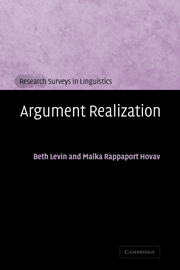Book contents
- Frontmatter
- Contents
- Acknowledgments
- Introduction
- 1 Challenges for theories of argument realization
- 2 Semantic role lists
- 3 Current approaches to lexical semantic representation
- 4 Three conceptualizations of events
- 5 The mapping from lexical semantics to syntax
- 6 Thematic hierarchies in argument realization
- 7 Multiple argument realization
- 8 Postscript
- References
- Index of topics
- Index of authors
- Index of languages
8 - Postscript
Published online by Cambridge University Press: 28 October 2009
- Frontmatter
- Contents
- Acknowledgments
- Introduction
- 1 Challenges for theories of argument realization
- 2 Semantic role lists
- 3 Current approaches to lexical semantic representation
- 4 Three conceptualizations of events
- 5 The mapping from lexical semantics to syntax
- 6 Thematic hierarchies in argument realization
- 7 Multiple argument realization
- 8 Postscript
- References
- Index of topics
- Index of authors
- Index of languages
Summary
Over thirty-five years have passed since the publication of Fillmore's “The Case for Case” (1968), the first substantive generative attempt to lay out a program of deriving the morphosyntactic realization of a verb's arguments from relevant semantic properties. In this book we have reviewed a considerable number of issues pertaining to this research program. In this postscript we step back from the myriad details and take stock of the overall picture which has emerged, asking how our understanding of this complex area has advanced since Fillmore's seminal paper. In the introduction we set out the issues which a comprehensive theory of argument realization must address. We now use these issues as a framework for summarizing the results presented in our survey of argument realization, reviewing what kind of consensus has emerged with respect to each. As we stressed at the outset, we do not present results meant to be embedded in any particular theory of grammar, and we have tried to abstract away from issues which divide linguists of different theoretical persuasions. We believe that a body of knowledge has accumulated about which there should be little dispute and which needs to be taken into consideration in developing a theory of argument realization regardless of the larger grammatical framework in which it is couched.
Which elements of meaning are relevant for the mapping from lexical semantics to morphosyntactic expression? As mentioned in the conclusion to chapter 4, broadly speaking these are aspectual notions, causal notions, and notions related to sentience or potential volitionality.
- Type
- Chapter
- Information
- Argument Realization , pp. 237 - 241Publisher: Cambridge University PressPrint publication year: 2005

